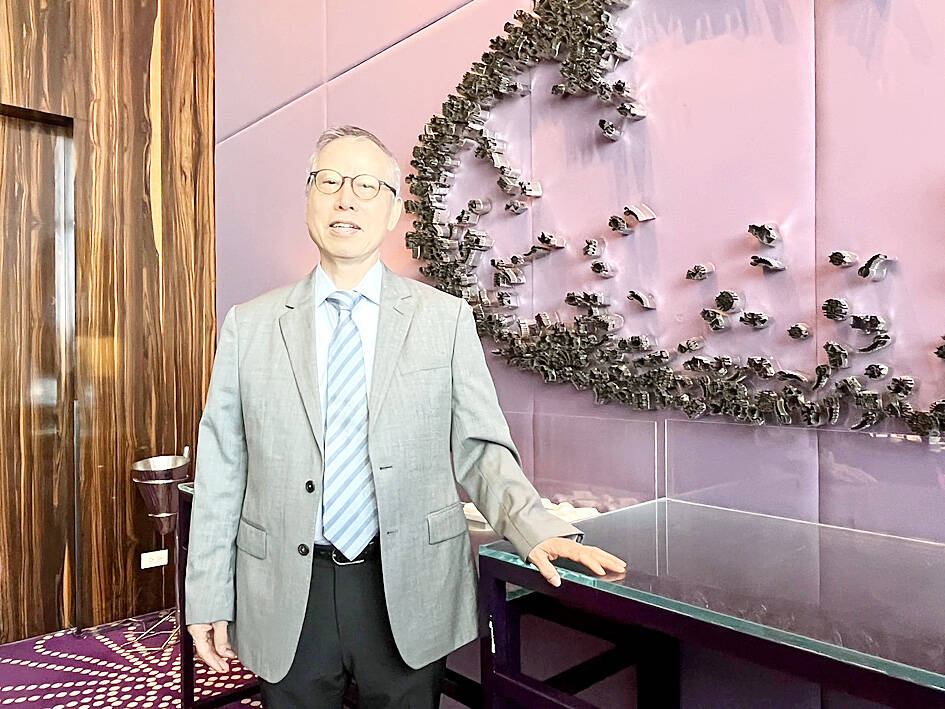Solar cell and module manufacturers are experiencing low factory utilization in the wake of energy-related political scandals, United Renewable Energy Co (URE, 聯合再生) said yesterday, adding that companies would only meet half of the government’s targeted solar power installations this year.
The Hsinchu-based company’s remarks came after some local government officials were caught up in scandals linked to green energy installations, and following the suspension of a number of solar projects amid bribery investigations.
Some local governments have reportedly shelved solar energy programs due to concern over allegedly toxic solar panels and potential pollution.

Photo: Chang Hui-wen, Taipei Times
The Taiwan Photovoltaic Industry Association last week said that those claims were groundless and untrue.
In the wake of those allegations ahead of the upcoming presidential and legislative elections next year, companies would only be able to install less than 1 gigawatt of solar panels this year, half of the government’s annual installation target of 2 gigawatts, URE chairman Sam Hong (洪傳獻) said.
Hong said that the solar supply chain — from solar cell manufacturers, solar contractors that primarily perform engineering, procurement and construction work to solar farm developers — faces severe challenges ahead of the elections.
“This year is a bad year for all of us. It will be a challenge for URE and our peers to keep factory utilization at 50 percent,” he said. “Local governments put new development projects on hold. Besides, some projects that are ready to start have been postponed because of political factors.”
There is a slim chance to turn around production this year, given the tough environment for the industry, he said.
The company posted a NT$363 million (US$11.25 million) loss during the first half of this year, but Hong said he has high hopes for next year.
“Demand should come back after the elections,” he said, adding that the government should then accelerate solar projects to achieve its green energy goals.
The new-generation solar cell, called tunnel oxide passivated contact (TOPCon), is expected to become a mainstream product, as it delivers better efficiency than passivated emitter and rear contact solar cell technology, Hong said.
The upgrade also offers better profit margins for cell makers, he added.
URE plans to ramp up its first TOPCon production line in the first half of next year, with an installed capacity of 400 megawatts in the initial stage, he said.
URE plans to showcase its latest products during the annual Energy Taiwan and Net-Zero Taiwan trade shows that begin tomorrow at Taipei Nangang Exhibition Center’s Hall 1.
The twin events are expected to attract 350 participants this year, including Motech Industries Inc (茂迪) and TSEC Corp (元晶太陽能), up 28 percent from the previous year, co-organizer the Taiwan External Trade Development Council (外貿協會) said.

When an apartment comes up for rent in Germany’s big cities, hundreds of prospective tenants often queue down the street to view it, but the acute shortage of affordable housing is getting scant attention ahead of today’s snap general election. “Housing is one of the main problems for people, but nobody talks about it, nobody takes it seriously,” said Andreas Ibel, president of Build Europe, an association representing housing developers. Migration and the sluggish economy top the list of voters’ concerns, but analysts say housing policy fails to break through as returns on investment take time to register, making the

NOT TO WORRY: Some people are concerned funds might continue moving out of the country, but the central bank said financial account outflows are not unusual in Taiwan Taiwan’s outbound investments hit a new high last year due to investments made by contract chipmaker Taiwan Semiconductor Manufacturing Co (TSMC, 台積電) and other major manufacturers to boost global expansion, the central bank said on Thursday. The net increase in outbound investments last year reached a record US$21.05 billion, while the net increase in outbound investments by Taiwanese residents reached a record US$31.98 billion, central bank data showed. Chen Fei-wen (陳斐紋), deputy director of the central bank’s Department of Economic Research, said the increase was largely due to TSMC’s efforts to expand production in the US and Japan. Investments by Vanguard International

STRUGGLING TO SURVIVE: The group is proposing a consortium of investors, with Tesla as the largest backer, and possibly a minority investment by Hon Hai Precision Nissan Motor Co shares jumped after the Financial Times reported that a high-level Japanese group has drawn up plans to seek investment from Elon Musk’s Tesla Inc to aid the struggling automaker. The group believes the electric vehicle (EV) maker is interested in acquiring Nissan’s plants in the US, the newspaper reported, citing people it did not identify. The proposal envisions a consortium of investors, with Tesla as the largest backer, but also includes the possibility of a minority investment by Hon Hai Precision Industry Co (鴻海精密) to prevent a full takeover by the Apple supplier, the report said. The group is

EARLY TALKS: Measures under consideration include convincing allies to match US curbs, further restricting exports of AI chips or GPUs, and blocking Chinese investments US President Donald Trump’s administration is sketching out tougher versions of US semiconductor curbs and pressuring key allies to escalate their restrictions on China’s chip industry, an early indication the new US president plans to expand efforts that began under former US president Joe Biden to limit Beijing’s technological prowess. Trump officials recently met with their Japanese and Dutch counterparts about restricting Tokyo Electron Ltd and ASML Holding NV engineers from maintaining semiconductor gear in China, people familiar with the matter said. The aim, which was also a priority for Biden, is to see key allies match China curbs the US